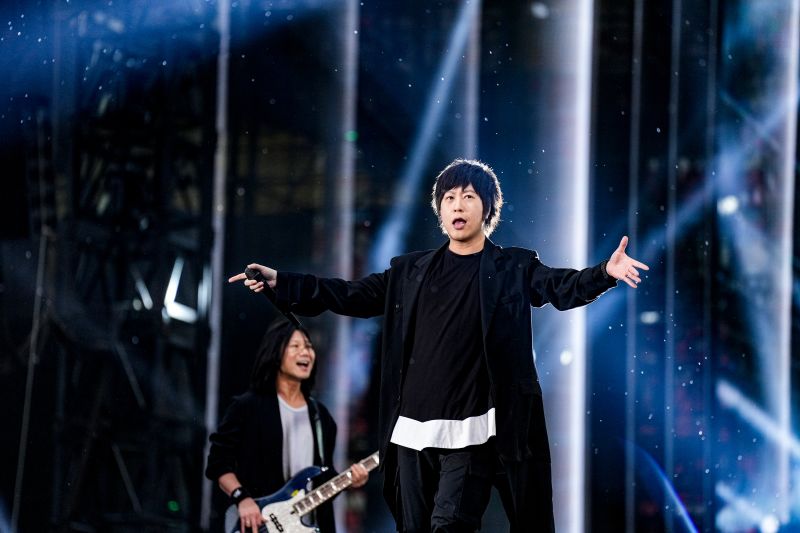
China lip-synch probe into top Taiwanese rock band is politically motivated, Taiwan intelligence officials claim
China’s ongoing investigation into alleged lip-synching by a popular Taiwanese rock band may be linked to attempts by Beijing to influence the island’s upcoming election, Taiwan security officials have claimed.
Mayday, one of the most prominent rock groups in the Chinese-speaking world, has been under an official probe in China since early December over alleged lip-synching during their recent Shanghai shows. The band’s label has repeatedly denied the accusations.
In a recent briefing on security affairs, two Taiwanese intelligence officials claimed that Chinese authorities had for months pressured Mayday to publicly declare that both China and Taiwan belong to the same country. The repeated requests coincided with the start of the band’s China tour in May, claimed the Taiwanese officials, who asked not to be named for security reasons.
The Taiwanese officials claimed that when Mayday refused to comply, the Chinese Communist Party’s powerful propaganda department coordinated with state media to generate widespread public discussions about alleged lip-synching at their concerts to pressurize them.
“We have decided to publicize the incident because it is the first time they have gone after (Taiwanese artists) on such an unprecedented scale,” the officials said.
The Taiwanese officials said they suspected the Chinese investigation into Mayday could be related to Taiwan’s presidential election in January. Taiwan has previously accused Beijing of employing a range of disinformation, military and economic operations to influence the race.
Tensions across the Taiwan Strait have been on the rise in recent years, with China’s ruling Communist Party ramping up military and political pressure on Taiwan, where parties’ differing views on relations with China often make elections a litmus test for public sentiment on Beijing. Taiwan’s current ruling party is loathed by Beijing’s leaders.
But three sources familiar with Taiwan’s pop music scene said it is not uncommon for Taiwanese artists to face political restrictions in exchange for permission to perform in mainland China, a highly lucrative market because of its huge population.
The allegations
Some artists from Taiwan have encountered difficulties in China for being outspoken about the self-governing island, which China’s Communist Party leaders view as their own territory despite never having controlled it.
But Mayday – sometimes dubbed the “Asian Beatles” – has largely steered clear of politics and maintained huge popularity among mainland Chinese fans.
The lip-synching accusations centered on Mayday’s recent shows in Shanghai, where it performed eight times over 10 days in mid-November, to a combined audience of more than 360,000.
The controversy began in late November when a music vlogger on Bilibili, one of China’s biggest video-sharing platforms, posted a video in which he used computer software to analyze the vocals of 12 songs recorded live by a fan at Mayday’s concert in Shanghai on November 16.
The vlogger claimed his analysis found the band’s lead singer, Ashin, lip-synched at least five songs during the three-hour gig, saying the vocalist’s singing was precisely in tune for those numbers, while drifting in and out of pitch drastically in the other songs.
The vlogger’s allegations quickly gained traction on social media platform Weibo, becoming the top trending topic and garnering hundreds of millions of views.
The Shanghai Culture and Tourism Bureau, a municipal government department overseeing commercial performances, announced an investigation on December 3 – in a move widely reported by major Chinese state media.
In a statement earlier this month, Mayday’s record company B’in Music dismissed the lip-synching accusations as “malicious attacks, rumors and slander,” saying they had seriously damaged the band’s image.
On Monday, the Shanghai Culture and Tourism Bureau said the investigation was ongoing, according to Chinese media.
Shifting red lines
Taiwanese artists have previously found themselves in hot water for crossing political red lines while performing in China, even with seemingly innocuous comments.
In August, a Taiwanese indie band faced significant backlash after telling a crowd in Shanghai they were delighted to be holding their first-ever performance in China – a slip of the tongue that seemed to infer Taiwan is not part of the country. They subsequently apologized and offered refunds.
In 2000, popular Taiwanese singer A-mei faced a year-long ban after she performed the island’s official anthem at the inauguration ceremony of former President Chen Shui-bian. Chen represented the Democratic Progressive Party, which is ostracized in Beijing for its pro-independence leanings.
“Many Taiwanese artists have to engage in self-censorship,” said a veteran Taiwanese music producer, who asked not to publish his name because he is still working in the industry.
“They often cannot say anything related to Taiwan’s politics, or they could easily lose their opportunity to perform [in China].”
The producer also noted that it was unusual for lip-synching allegations to make big headlines in China.
“There are so many similar allegations against different artists every year, and it is really unusual for it to blow up like this,” they said.
Lin Chen-yu, a lecturer at Cardiff University who specializes in China’s censorship of Taiwanese music, said the pressure facing Taiwanese artists has increased in recent years.
While simply not making pro-Taipei statements used to be enough, Taiwanese artists have increasingly faced pressure from Chinese authorities to declare support for “the motherland,” Lin said.
For example, a number of Taiwanese artists have posted on social media to celebrate China’s national day in recent years, while remaining silent on Taiwan’s own national day, she said.
“The pressure is especially bigger for mega stars,” she added.
